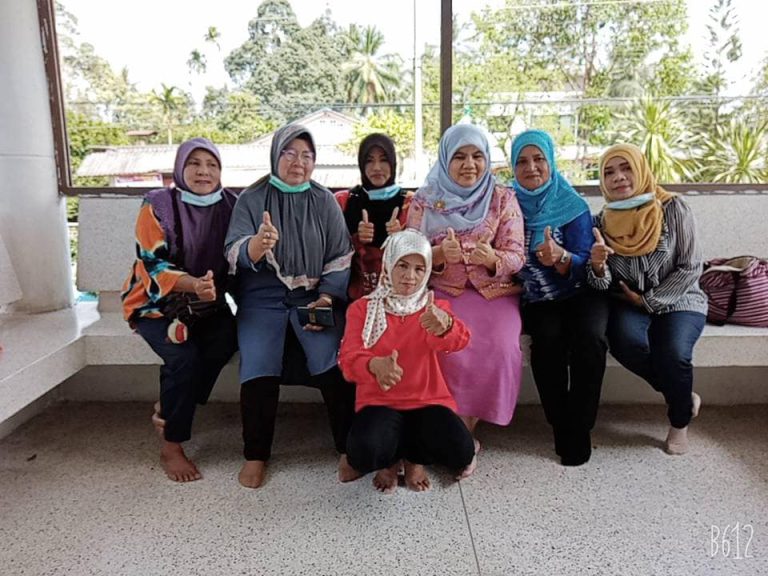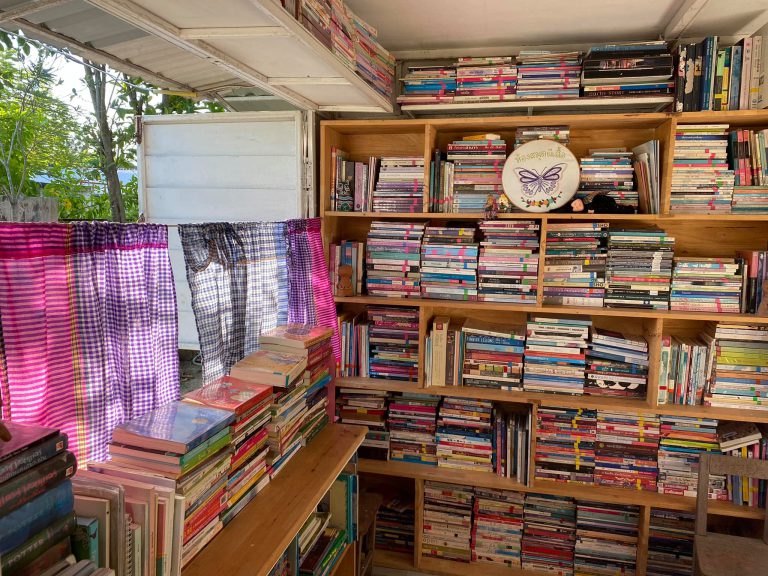Story: Ekkapop Sittiwantana
The cause of your suffering is not your illness but the fact that you don’t want to be sick. You resist and struggle against it, but you can’t shed your disease. Even the doctor can’t do that for you.
The moment you accept your condition, it’s easy — you can smile. Acceptance isn’t just good for us, but the people around us as well. Many of them feel encouraged from simply seeing us smile. We’re also happy too, to see that sharing is a lot easier than we thought. A positive spirit and kind heart is all it takes to lift their spirits as well. A lot of good things can happen…
This is an observation, drawn from personal experience, from a woman named Kan, an ordinary person with terminal cancer. Since death has come to take her to task with a formidable test. Kan’s experiences and insights will likely be useful to many people, including me. Kan is delighted to share her story through the “What Does Life Teach Us?” Project, which is run by the staff and volunteers of the Buddhika network.
Many have remarked that Kan is still young, a mere 33 years old — she shouldn’t have stage 4 bladder cancer. But the truth is, life is unpredictable. Who can dictate that they will be healthy forever?
After the cancer diagnosis, Kan was swept into the treatment process. Initially, she received chemotherapy and part of her bladder was removed. Both procedures were equally matched in the torment they caused her. At a certain point, Kan decided to stop chemotherapy and cease treatment for a year. In that year, she travelled anywhere she wanted, volunteered, and began seriously practicing buddhism.
The next year, the cancer returned with three large tumors; she had no choice but to remove the rest of her bladder. Therefore, Kan urinates through a tube inserted below her navel (urinary catheter). She also had another complication: her right leg became numb; she couldn’t move it or walk. She is still rehabilitating her leg at present.
Death, Fear and Acceptance
Formerly, though Kan knew that death is an eventuality, she had thought that it was far off. That is, until she was diagnosed with stage 4 cancer, for then she realized that death had drawn close in a perceptible and tangible manner.
Kan was tormented by the words “cancer” and “stage 4”. When she saw the other patients in neighboring beds who were suffering terribly, she became even more terrified. However, once she began to take a more serious interest in buddhist practice, she gradually realized that the future that filled her with fear had yet to arrive. At present, her body was still strong; she was still capable of doing many things. Only then was she better able to accept that she had cancer and was dying.
Though the truth was harsh, once Kan was able to accept it, she found that she smiles easier and wider than before. The people around her are also uplifted by her energy and strength.
Even though Kan has reconciled herself with death, she still has an interesting reflection on the fear death to share:
“Acceptance and fear are two separate things. Some people don’t understand this. Say, we are afraid of getting surgery, but we can accept it, so we have the courage to go into the operating room. It’s the same with death. Though I am afraid, I have begun to move towards greater acceptance of it. Whenever death comes, I’ll be willing to go”.
To be Through with Life
The acceptance of death makes us feel like we are “through” with treatment. We can choose to accept or decline different kinds of treatment. I think that an acceptance of death was a significant factor that allowed Kan to maintain a balance between well-being, longevity and the dignity to determine her own destiny.
In addition to studying buddhism and being able to accept death, another factor that allowed her to let go of her life was the fulfilment of most of her life’s desires. “What I wanted to study, I got to study; if I wanted to travel, I travelled; any work I wanted to do, I did. And I got to practice Buddhism”. Therefore, the attachment to a long life held little meaning for her.
Kan shared another insight that others who have a family and loved ones, love and attachments may find it difficult to let go of life and accept death. She says that she is fortunate not to have a husband, otherwise her circumstances would be different and much more difficult.
The cost of treatment is an important consideration, since cancer is a serious disease, and requires sustained treatment over a long period of time. Therefore, Kan chose to be treated at a public hospital under her universal health insurance. Kan does not want to run her savings dry on treatment costs. Her family’s financial situation after she passes away is a significant issue for her.
Additionally, she sees a doctor who provides her with palliative care treatment. Kan is therefore confident that her pain will be well-managed in the last stage of her life, and that the preferences she expressed will be respected. She smiles wider than before because she has a confidant, who will take care of her will-being until her time comes to pass away.
From Sickness to Sharing via the Facebook Page “Cancer Transformed my Life”
Since Kan’s allotted time with their doctor is terribly short, the internet has become an important source of knowledge on healthcare for her (and all of us).
She regularly visits foreign healthcare websites for patients with a urinary catheter to accrue information. Many foreigners are quite incredible, she found: though they have a catheter inserted in their stomach, they swim, run marathons and easily scale mountains. They inspired her to find greater happiness in sickness. Unfortunately, this information tended to be in a foreign language, so she decided to create a facebook page called “Cancer Transformed my Life” to document her experience of having cancer and her perspective on life.
The success of the page exceeded her expectations. Instead of just providing others with information, she was inspiring a multitude of friends and strangers. Moreover, she counselled fellow patients who were going through similar experiences and learned about her fans’ life journeys. Virtually mediated companionship is no longer out of the ordinary. At present, she continues to look after her page, which has more than 700 followers.
Based on the excellent care of her physical and emotional well-being, Kan has a considerable amount of time left to prepare herself for the loss that her family are soon to experience. She has accrued good deeds through sharing knowledge and encouragement to those close to her. It is all one part of studying and practicing the buddhist way in real life, enriching and extending the buddhist principles. It seems like Kan has taught us that sometimes, we access the value and meaning of our lives with serenity and joy only once we confront pain, sickness and death with the right state of mind.
30th October 2014



